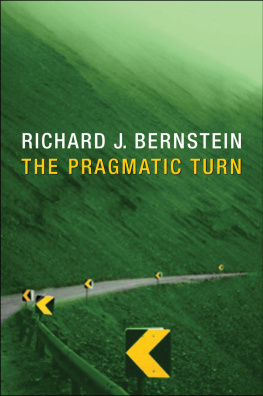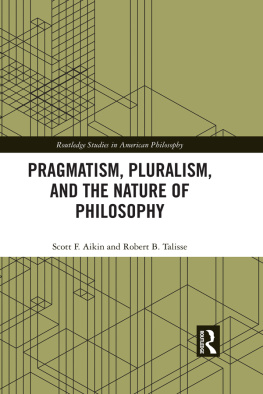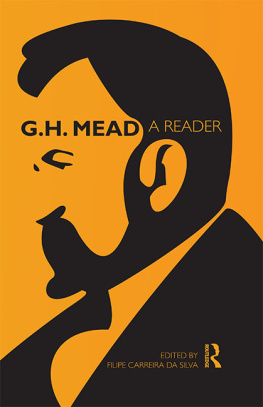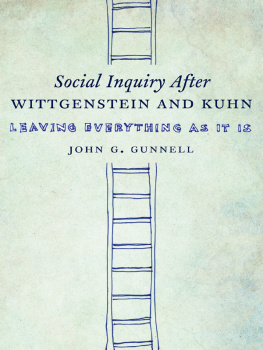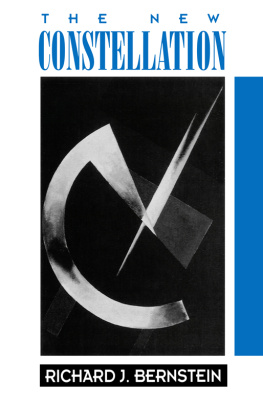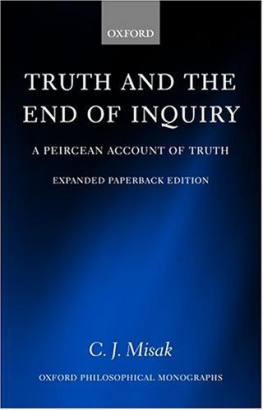Copyright Richard J. Bernstein, 2010
The right of Richard J. Bernstein to be identified as Author of this Work has been asserted in accordance with the UK Copyright, Designs and Patents Act 1988.
First published in 2010 by Polity Press
Polity Press
65 Bridge Street
Cambridge CB2 1UR, UK
Polity Press
350 Main Street
Malden, MA 02148, USA
All rights reserved. Except for the quotation of short passages for the purpose of criticism and review, no part of this publication may be reproduced, stored in a retrieval system, or transmitted, in any form or by any means, electronic, mechanical, photocopying, recording or otherwise, without the prior permission of the publisher.
ISBN-13: 978-0-7456-4907-8 (hardback)
ISBN-13: 978-0-7456-4908-5 (paperback)
ISBN-13: 978-0-7456-5946-6 (Single-user ebook)
ISBN-13: 978-0-7456-5945-9 (Multi-user ebook)
A catalogue record for this book is available from the British Library.
The publisher has used its best endeavours to ensure that the URLs for external websites referred to in this book are correct and active at the time of going to press. However, the publisher has no responsibility for the websites and can make no guarantee that a site will remain live or that the content is or will remain appropriate.
Every effort has been made to trace all copyright holders, but if any have been inadvertently overlooked the publisher will be pleased to include any necessary credits in any subsequent reprint or edition.
For further information on Polity, visit our website: www.politybooks.com
For Richard and Mary Rorty
Davidson may have been right when he wrote that a sea change is occurring in recent philosophical thought a change so profound that we may not recognize that it is occurring. If the change of which Davidson spoke is someday recognized as having occurred [then] Peirce, James, and Dewey may cease to be treated as provincial figures. They may be given the place I think they deserve in the story of the Wests intellectual progress.
Richard Rorty
Acknowledgments
I am grateful for permission to use revised versions of my previously published work. John Deweys Vision of Radical Democracy, in The Cambridge Companion to Dewey , ed. Molly Cochron (Cambridge: Cambridge University Press, 2010); Hegel and Pragmatism, in Von der Logik zur Sprache: Stuttgarter Hegel-Kongress, 2005 , ed. R. Bubner and G. Hindrichs (Stuttgart: Kett-Cotta, 2007); Pragmatism, Objectivity, and Truth, Philosophical Topics , 36/1 (Spring 2008); The Pragmatic Turn: The Entanglement of Fact and Value, in Hilary Putnam , ed. Y. Ben-Menahem (Cambridge: Cambridge University Press, 2005); Rortys Deep Humanism, New Literary History , 39/1 (Winter 2008).
I also want to thank Scott Shushan and Erick Raphael Jimnez who helped in numerous ways to edit the manuscript. Professor Carol Bernsteins perceptive detailed comments and challenging criticisms were, as always, invaluable. Jean van Altena edited my manuscript with great care and excellent judgment. John Thompson has encouraged me at every stage at working on this book.
Preface
When I wrote my dissertation on John Dewey in the 1950s, interest in Dewey and pragmatism seemed to be at an all-time low among academic philosophers. The pragmatists were thought to be pass and to have been displaced by the new linguistic turn in analytic philosophy. I felt then (and continue to believe) that Peirce, James, Dewey, and Mead were really ahead of their time that they were initiating a sea change in philosophy. Over the years I have explored the works of a variety of thinkers working in Anglo-American and Continental traditions. But it has struck me over and over again that many twentieth- and twenty-first-century philosophers some of whom had little or no knowledge of the classical pragmatic thinkers were dealing with similar themes and coming to similar conclusions. In pursuing their distinctive inquiries, they were frequently refining (and, sometimes, challenging) themes prominent in the classical American pragmatists. Gradually, the rationale for this convergence became clear to me. Pragmatism begins with a radical critique of what Peirce called the spirit of Cartesianism. By this Peirce meant a framework of thinking that had come to dominate much of modern philosophy where sharp dichotomies are drawn between what is mental and physical, as well as subject and object; where genuine knowledge presumably rests upon indubitable foundations; and where we can bracket all prejudices by methodical doubt. This way of thinking introduces a whole series of interrelated problems that preoccupied philosophers: the problem of the external world, the problem of our knowledge of other minds, and the problem of how to correctly represent reality. The pragmatic thinkers called into question the framework in which these traditional problems had been formulated. They rejected what Dewey called the quest for certainty and the spectator theory of knowledge. They sought to develop a comprehensive alternative to Cartesianism a nonfoundational self-corrective conception of human inquiry based upon an understanding of how human agents are formed by, and actively participate in shaping, normative social practices. And they showed the critical role that philosophy can play in guiding our conduct, enriching our everyday experience, and furthering creative democracy.
The sharp critique of Cartesianism is also characteristic of two of the most influential philosophers of the twentieth century: Wittgenstein and Heidegger. Neither of them had any serious knowledge of American pragmatism, but in very different ways they were responding to the same deficiencies of modern philosophy that had provoked the pragmatists. It is striking how they (and others influenced by them) came to share many of the same insights of the pragmatists in what Heidegger calls our being-in-the-world and Wittgenstein calls forms of life.
There is a popular belief that, in the mid-twentieth century, the linguistic turn and analytic philosophy displaced pragmatism. But in the past few decades the continuity between the classical American pragmatists and much of the best work by analytic philosophers including Quine, Davidson, and Sellars has become increasingly evident. Pragmatism began as a distinctive American philosophical movement, but it has had a global reach. This is evident in the influence of pragmatism on post-Second World War German philosophy. Apel, Habermas, Wellmer, Honneth, and Joas have all appropriated and contributed to the development of pragmatic themes. Today there are more and more thinkers all over the world who have come to appreciate the contributions of the classical American pragmatists.
Frequently, academic philosophers speak about the Anglo-American analytic/Continental split, but this unfortunate dichotomy obscures more than it illuminates. Philosophers from both sides of the split are discovering how much they can learn from styles of thinking that initially seem so alien. My basic thesis is that, during the past 150 years, philosophers working in different traditions have explored and refined themes that were prominent in the pragmatic movement. In the Prologue, I examine the origins of American pragmatism and set forth my general thesis about the dominance of pragmatic themes in contemporary philosophy. The next three chapters explore central issues in Peirce, James, and Dewey. I then turn to examining the Hegelian influence on pragmatism; the pragmatic understanding of justification, objectivity, and truth; and the role of experience after the linguistic turn. The final chapters deal with three of the most important thinkers shaped by the pragmatic tradition: Hilary Putnam, Jrgen Habermas, and Richard Rorty.

